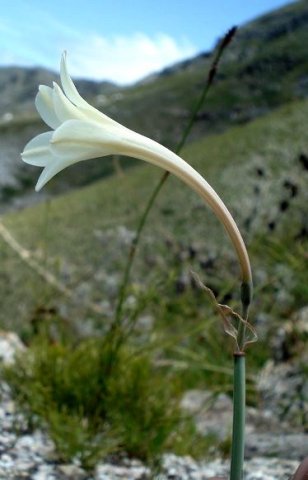Cyrtanthus

Author: Ivan Lätti
Photographer: Judd Kirkel Welwitch
Cyrtanthus is a genus of deciduous or evergreen, bulbous perennials in the Amaryllidaceae family.
The bulbs often split into clusters or produce bulbils around the mother bulbs that propagate the plants vegetatively. Bulbs may be partly or almost fully exposed above ground. Some species grow as epiphytes on other plants.
The leaves are few to several, erect or spreading and sometimes twisted or spiralled. The hairless leaves are strap-shaped, varying in width, sometimes with conspicuous midribs. The leaves may be present during or only after flowering.
The often-loose inflorescences are one to many-flowered on hairless and leafless scapes that are usually hollow. The two to four spathe valves covering the buds wither early. The pedicels are shorter than or equal to the perianths in length.
The erect, spreading or pendulous flowers are from regular to slightly irregular in shape, the latter ones being two-lipped from unequal segments. Perianth colours vary from red or orange to yellow or white, some species flowering bicoloured. The six segments of each perianth are joined in a tube somewhat dilating from the base, variably curved and flaring at the tips, or the tips even recurving.
The six stamens have filaments that arise from two heights in the perianth tube, sometimes with the filament bases expanding into false coronas. More species have anthers included in the perianths than exserted.
The inferior, three-locular ovaries are nearly globose, containing many ovules per locule. The styles are as long as or longer than the filaments, the stigmas three-lobed.
Some species are fragrant.
Most species flower notably better in the first season after fire, some responding quickly after fire.
The ellipsoid, oblong or ovoid capsules split along three longitudinal seams when ripe. They release flattened, wrinkled, black and mostly somewhat winged seeds.
There are around 56 Cyrtanthus species, widespread in southern Africa, a few found more to the north while about 50 occur in South Africa. The species habitats range from wet along streambanks to semi-arid and possibly even arid. The plants are winter or summer growing, often secluded on fairly inaccessible terrain that renders several species of no concern in terms of population stability early in the twenty first century.
In spite of some spectacular flowers, only few species have been cultivated extensively. Some Cyrtanthus species are easy to grow
The plant in picture is Cyrtanthus leucanthus (Leistner, (Ed.), 2000; Vlok and Schutte-Vlok, 2015; Manning, 2007; Wikipedia; http://pza.sanbi.org; https://plants.ces.ncsu.edu).

